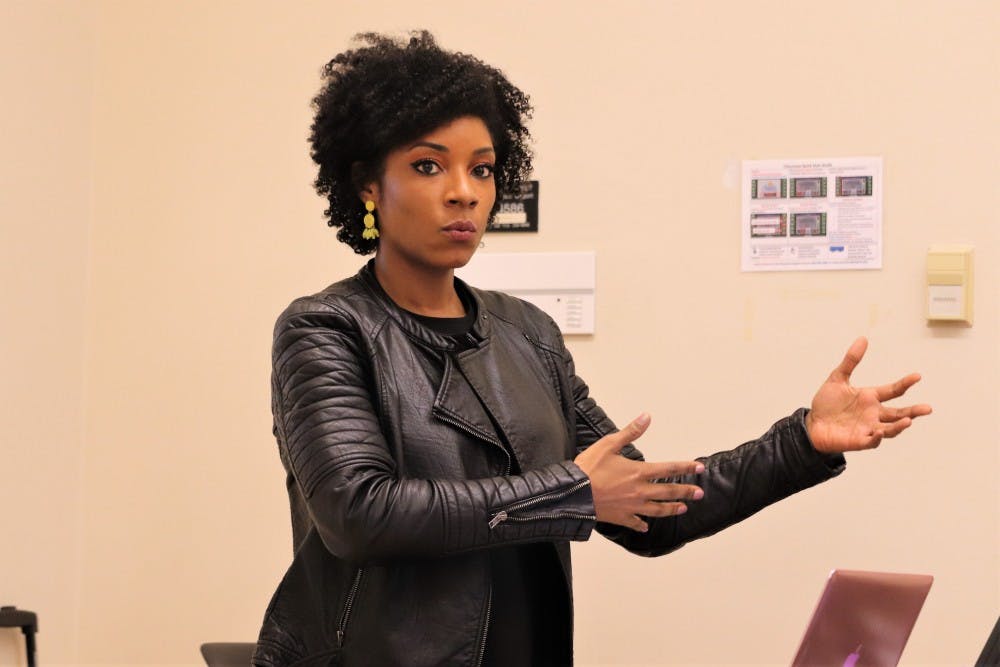Zerlina Maxwell — political analyst, commentator, writer and speaker — spoke about the presence of rape culture and its perpetuating practices both in person and in the media in Minor Hall Thursday afternoon. Maxwell has offered commentary on CNN, FOX News and MSNBC and has written online content for CNN.com, Black Enterprise, The Washington Post and The Huffington Post. Approximately 30 people attended Maxwell’s presentation.
Her presentation, titled “The Reckoning — How Can We Be Part of the Movement to End Rape Culture and Victim Blaming,” was sponsored by various University organizations, including the Maxine Platzer Lynn Women’s Center, the Center for Global Health Power, the Violence and Inequality Collective Office of the Vice President and Chief Officer for Diversity & Equity, the Office for Equal Opportunity and Civil Rights, the Women’s Leadership Council as well as the the Carter G. Woodson Institute for African American and African studies, the department of English and the department of Women, Gender & Sexuality.
Maxwell’s presentation outlined and explained each aspect of rape culture — including toxic masculinity, empathizing with rapists and trivializing rape — while emphasizing the role of victim disbelief and blaming in perpetuating rape culture.
Her presentation noted that “rape culture is more visible, and it’s a term that most people have heard of before even if they aren’t sure what it means or how it manifests in our everyday lives.”
“The purpose of this talk is to help you understand what rape culture is, how it manifests in our everyday lives, and how we can all work to dismantle it in our world, our media, our work places, on our campuses, and in social settings,” Maxwell said.
In an interview with The Cavalier Daily, Maxwell commented that changing culture on Grounds and culture as a whole starts with believing survivors. She said the first bad instinct for someone speaking to a survivor is to ask questions such as, “Are you sure?” or “Were you drinking?” Maxwell said the listener should instead respond with “I’m sorry that happened to you, how can I help?”
“Defaulting to empathy is something that I really feel like is a great place to start,” Maxwell said. “Don’t judge, just default to compassion. Your empathy should be placed with the person who’s experienced the trauma.”
Beyond how survivors are perceived in real life, Maxwell also commented on how the media largely portrays rape and rape survivors as untrustworthy or fodder for jokes about sexual assault.
“The mainstream media and our communities writ large often empathize with the accused rapists, immediately questioning the actions of the survivor, instead of the choices and actions of the rapist,” Maxwell said.
Second-year College student Maddy Ayalew also mentioned the significance of believing the victims of sexual assault.
“I think it’s really great that she emphasized the need for compassion,” Ayalew said. “Having compassion being the first step to take is always the right thing to do, and the best thing to do, and to not ask further questions beyond ‘What can I do to help you.’”
Beyond recognition of victim’s trauma, Maxwell’s presentation also addressed the prevalence of sexual harassment and catcalling on college campuses and how common it is for men to make inappropriate comments about women’s bodies.
“It shouldn’t be that way,” Maxwell said. “Women should be able to go outside and walk around in the public sphere and not be sexually harassed.”
She rejected traditional claims about the acceptability of these actions, stating that we should alter our standards of acceptable behavior in public and in private.
“Boys will be boys, right?” Maxwell said. “I don’t believe that that’s true. In fact, I think that’s a very low opinion of men. In fact, I think men are perfectly capable of doing the right thing and want to do the right thing.”
In an interview with The Cavalier Daily, Charlottesville community member Melissa Hannah commented on how Maxwell’s presentation addressed the prevalence of sexual assault.
“It does happen, everywhere.” Hannah said. “You have to evaluate your day to day life and who you interact with, and how do we, unconsciously or not, contribute to this culture.”
Graduate Arts & Sciences student Christof Fehrman commented on the prevalence of rape culture in popular media — another aspect of Maxwell’s presentation. Fehrman noted how important it was that Maxwell’s presentation showed “the ubiquity of rape culture in media, with advertisements, with songs, movies.”
“It can show us that sometimes people think that there’s rape culture, and we’re trying to go after it, but we don’t realize that we can also be a part of it,” Fehrman said.





